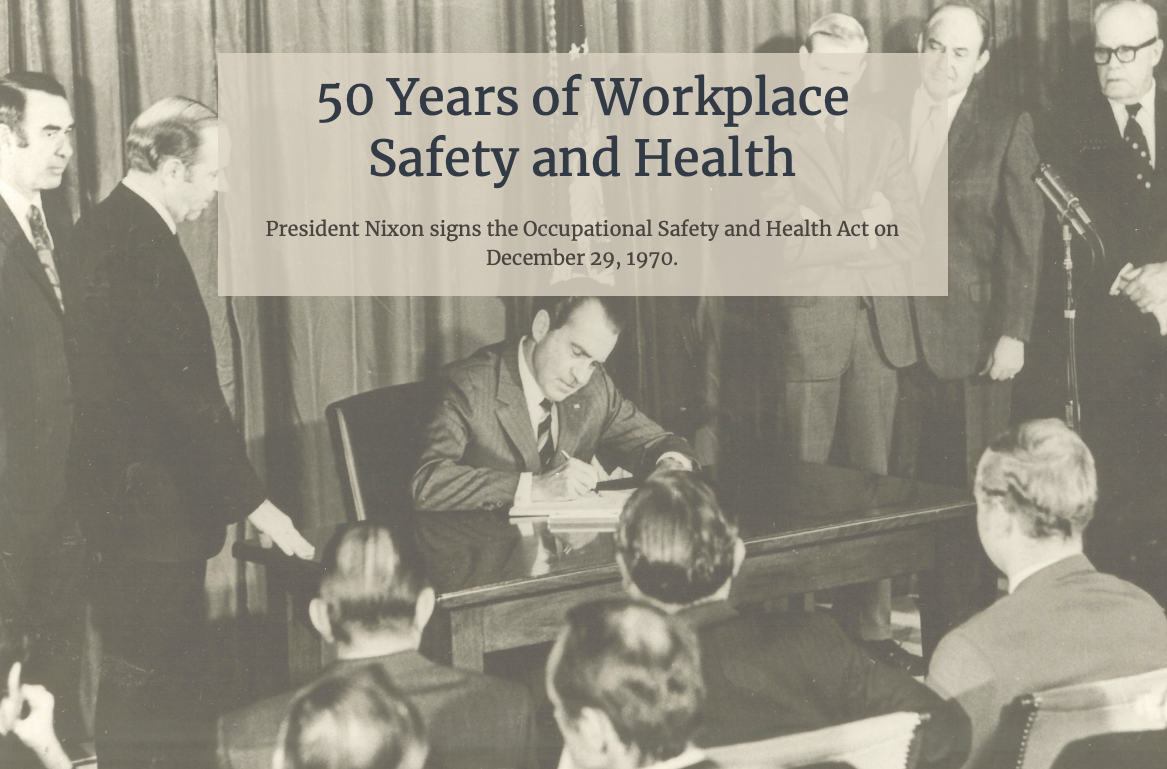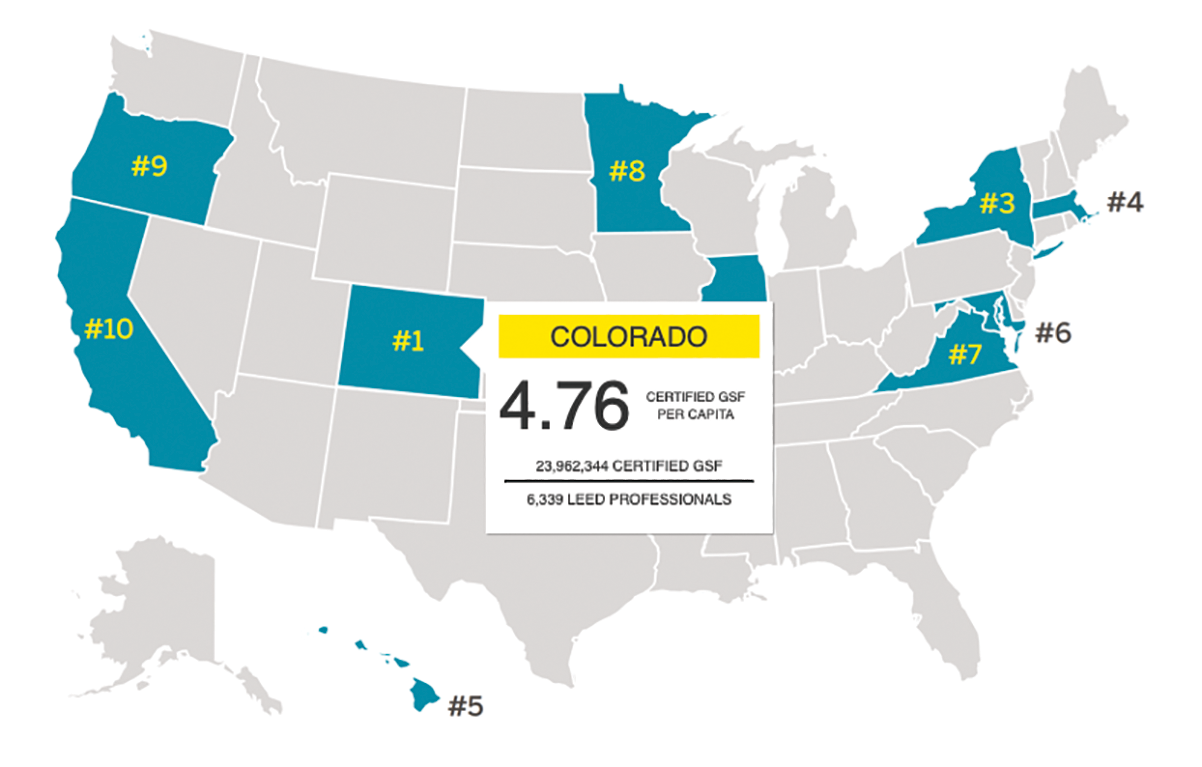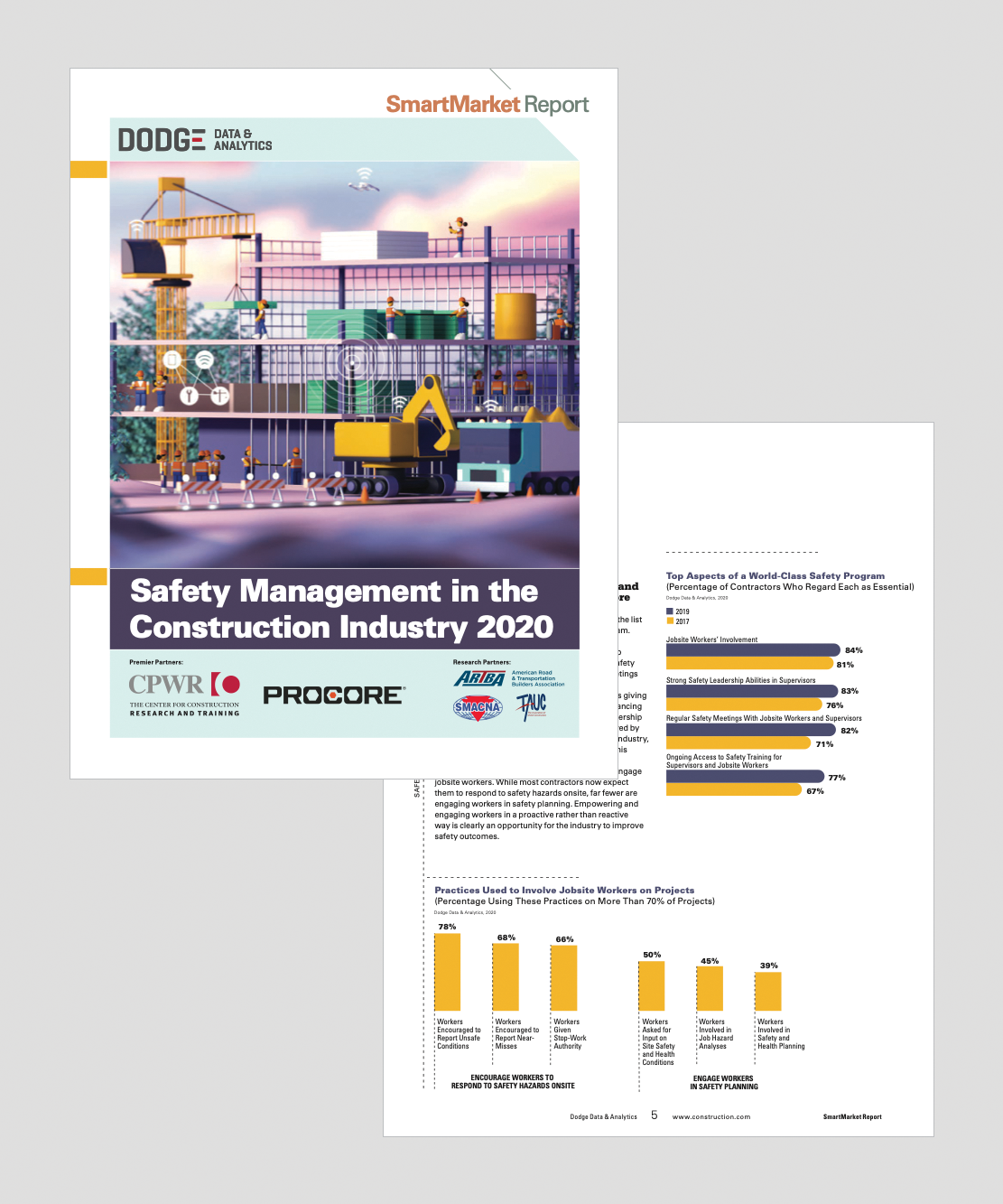OSHA launches commemorative webpage

|
The Occupational Safety and Health Administration has launched a new webpage marking the 50th anniversary of the Occupational Safety and Health Act of 1970, a landmark worker safety and health law signed by former President Richard Nixon that led to the creation of OSHA.
The webpage highlights transformative workplace improvements enacted during the past 50 years, including OSHA’s first standards and whistleblower protections, assistance programs for small businesses, and the creation of training centers and education grants to help employers and employees understand and comply with the law.
Additional information, including the agency’s anniversary events, is available at www.osha.gov/osha50.
Colorado tops ranking of states for LEED® green building

|
Colorado topped the U.S. Green Building Council’s annual ranking of states for LEED green building in 2019, according to forconstructionpros.com. Illinois, New York, Massachusetts and Hawaii rounded out the top five.
Each state was ranked based on its number of LEED-certified square feet per capita. In 2019, Colorado certified 102 LEED projects for a total of 4.76 square feet of LEED-certified building space per person. During 2019, there were 2,209 LEED projects in the U.S. totaling more than 501.08 million square feet of LEED-certified building space.
Other states in the top 10 included Maryland, Virginia, Minnesota, Oregon and California. Minnesota and Oregon missed the top 10 in 2018 and reemerged in eighth and ninth place, respectively, in 2019. USGBC notes Washington, D.C., would have had the highest ranking with 143 LEED projects totaling 52.86 LEED-certified square feet per capita, but it is not included because it is not a state.
IRS launches Identity Theft Central
In February, the IRS launched Identity Theft Central, an online resource designed to improve access to information regarding identity theft and data security protection for taxpayers, tax professionals and businesses.
Identity Theft Central provides resources regarding online scams, how to report identity theft and how taxpayers can protect themselves against phishing, among other topics.
Identity Theft Central is available at www.irs.gov/identity-theft-central.
Dodge Data & Analytics releases construction safety report

|
Dodge Data & Analytics has released its Safety Management in the Construction Industry 2020 SmartMarket Report. Created with support from the Center for Construction Research and Training and construction management software provider Procore, the report revealed construction contractors’ safety insights.
The report revealed job-site supervisors increasingly are a key part of successful construction safety programs. Eighty-four percent of respondents said supervisors are a critical component to job-site worker involvement in safety programs. Respondents also reported strong safety leadership abilities in supervisors (83%), regular safety meetings with job-site workers and supervisors (82%), and ongoing access to safety training for supervisors and job-site workers (77%) are important safety program elements. In addition, 73% of respondents said they rely on supervisors and foremen to deliver safety training to job-site workers.
The report also revealed business benefits related to construction safety management programs. Sixty-nine percent of respondents said having a safety management program increased their ability to attract new work, and 57% reported improvements in their ability to retain staff.
Respondents were asked about strategies to improve safety management. Two-thirds of contractors encourage workers to react to and report hazards on job sites. Half of respondents said they ask workers for input regarding safety conditions, but only 39% involve workers in safety planning.
Contractors expect to increase their use of online safety training during the next few years, but, surprisingly, a lower percentage of contractors reported using online training in 2019 than in 2017. Respondents remained excited about the potential for technology to improve construction safety, including wearable devices, virtual reality for training and visual monitoring employing artificial intelligence.
The Safety Management in the Construction Industry 2020 SmartMarket Report is available at www.construction.com/toolkit/reports.
Study reveals value of associate degrees, construction certificates

|
A new study from the Georgetown University Center on Education and the Workforce revealed associate degrees and certificates in construction and engineering can lead to careers with earnings more than bachelor’s degrees in other fields, according to www.constructiondive.com.
“The Overlooked Value of Certificates and Associate’s Degrees: What Students Need to Know Before They Go to College” found the combined number of certificates and associate degrees awarded by colleges is similar to the number of bachelor’s degrees awarded—about 2 million per year. Certificates and associate degrees each account for about 1 million.
The study showed workers with associate degrees in engineering or architecture have median earnings about twice as much as workers with associate degrees in education or the arts. Workers with certificates in engineering technologies have median annual salaries between $70,000 and $150,000, which outpaces the median earnings for workers with certificates in education. Certificate holders in construction trades have a median salary between $40,000 and $50,000, which is more than certificate holders in the computer science, business management, accounting, healthcare or education fields.
In addition, the study confirmed associate degree and certificate programs not only provide the opportunity to earn a competitive salary but are strongly linked to specific careers. Associate degrees include a mix of general education and career preparation, and certificates are almost exclusively career-oriented; about 94% of certification programs and 57% of associate degrees awarded in the U.S. are in career-oriented fields.
In the U.S., about 50% of postsecondary students taking undergraduate coursework are enrolled in certificate and associate degree programs; 47% are enrolled in bachelor’s degree programs; and 3% are taking coursework but are not enrolled in certificate or degree programs.
Tropical Roofing Products joins NRCA’s One Voice initiative
NRCA has announced Tropical Roofing Products, Hallandale, Fla., has joined its One Voice initiative as a partner member.
NRCA’s One Voice initiative is a transformational approach to addressing the roofing industry’s most critical issues and concerns—with one voice—to secure its future.
NRCA invites manufacturers, distributors, architects, engineers, consultants and service providers to fully engage with NRCA, as partners, and actively address the industry’s most pressing issues, including workforce and work certification; affecting change in Washington, D.C.; building codes and insurance; and increasing professionalism in all industry sectors.
Additional information about NRCA and its One Voice initiative, including a list of all current One Voice member partners, is available at www.nrca.net/onevoice.
Court dismisses class action lawsuits involving CSSB
A U.S. district court judge recently entered an order dismissing all class action lawsuits against the Cedar Shake & Shingle Bureau® and other defendants regarding price-fixing claims, according to CSSB.
In February 2019, S&W Forest Products Ltd., Maple Ridge, B.C., filed a lawsuit in a U.S. district court in Seattle against CSSB; Anbrook Industries Ltd., Pitt Meadows, B.C.; and Waldun Forest Products Ltd., Maple Ridge.
S&W Forest Products alleged it was wrongfully terminated as a CSSB member in December 2018 in violation of U.S. antitrust laws because it had refused to join a price-fixing conspiracy led by CSSB, Anbrook Industries and Waldun Forest Products that included other CSSB Mill-Members.
Based on the allegations, four copycat class action lawsuits were filed in U.S. district courts in Seattle and New York City against CSSB; Anbrook Industries; Waldun Forest Products; and G&R Cedar Ltd., Chilliwack, B.C., alleging they and all CSSB Mill-Members other than S&W Forest Products had been conspiring to fix their prices since at least 2011. The class action lawsuits were consolidated with the S&W Forest Products lawsuit in a U.S. district court in Seattle.
In August 2019, U.S. District Court Judge Marsha Pechman entered an order dismissing S&W Forest Products’ antitrust claims because the company, among other reasons, was unable to allege any facts supporting its price-fixing allegations and other conspiracy allegations. In October 2019, CSSB and S&W Forest Products agreed to settle the original lawsuit, which was dismissed with prejudice. At that time, S&W Forest Products confirmed “no one at S&W Forest Products has any personal knowledge of price fixing by anyone at CSSB or by any of CSSB’s members, nor do they have any personal knowledge that CSSB or any of its members ever participated in a conspiracy to fix prices.”
On Feb. 20, Pechman entered an order dismissing all the class action plaintiffs’ federal price-fixing claims against CSSB and the other defendants with prejudice, holding the plaintiffs also were unable to allege any direct or circumstantial evidence of price fixing by CSSB or any of its members, including Anbrook Industries, Waldun Forest Products and G&R Cedar. As a result, each class action lawsuit has been dismissed.
Additional seasonal guest worker visas made available

|
On April 1, the Department of Homeland Security made available an additional 20,000 seasonal guest worker visas for employers; 15,000 more visas will become available May 15. The visas will supplement the 66,000 visas typically available during a fiscal year.
DHS also unveiled new anti-fraud and abuse measures to protect the integrity of the H-2B visa program. One change is the program now will offer an opportunity for nationals of key Central American partner nations to work lawfully in the U.S. Of the additional 35,000 visas, 10,000 are specifically designated for nationals of Guatemala, El Salvador and Honduras to help reduce the flow of illegal migration in the region and encourage lawful migration to the U.S.
Additional measures intended to protect the program include requiring matching start dates on an H-2B petition and the employer’s start date of need, collaborating with the Department of Labor regarding increased employer site visits, and generally limiting the supplemental visas to returning workers who are known to follow immigration law in good faith.
The supplemental allocation of additional visas comes after extensive collaboration between stakeholders, including DOL and members of Congress. The move is intended to strike a careful balance that benefits U.S. businesses and U.S. workers.



